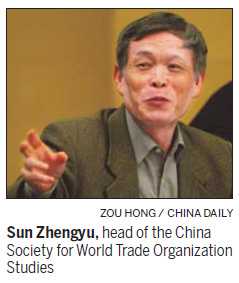Keeping the flag flying high at WTO
Updated: 2011-12-09 15:51
By Li Jiabao (China Daily)
|
|||||||||||

Sun Zhenyu, head of the China Society for World Trade Organization Studies, is a key figure in helping China enforce its World Trade Organization (WTO) commitments and a top expert in fighting trade friction cases targeting China.
"Fighting trade friction has become an important task for us as the high competitiveness of Chinese enterprises have made China the main target of anti-dumping and anti-subsidy investigations," said Sun, who served as ambassador and permanent representative of China to the WTO from January 2002 to December 2010.
During the nine-year period that Sun was the WTO ambassador, China became more open, transparent and market-oriented. Sun is widely recognized as the shaping force behind China's growing stature at the WTO.
"In the early years of China joining the WTO, there was lots of applause for our decision. But after China became a core member in 2008, the nation began to face more criticism and stricter norms. But no one can deny the fact that China is the second largest economy and the biggest exporter in the world," Sun said.
Sun says most of his WTO work was related to coping with trade frictions and enforcing China's WTO accession commitments and later on with the Doha Round negotiations.
After graduating from the Beijing Foreign Studies University in 1970, Sun became an expert on trade and investment and a key negotiator after more than two decades of work experience at the Ministry of Foreign Trade and Economic Cooperation (MOFTEC).
He also participated in several Sino-US bilateral negotiations on market access, textiles and intellectual property rights. In 1994, he served as the vice-minister of MOFTEC, responsible for regional policy, foreign investment and reform of State trading enterprises.
In the past 10 years, China accounted for less than 10 percent of the global exports, but one-third of the world's anti-dumping investigations and half of the anti-subsidy investigations are against China.
"Trade friction is spreading from low-end exports of industries like textiles and footwear to high-end sectors like equipment manufacturing, information industry, new energy, automobile and environment protection," Sun said.
According to Sun, trade friction, especially anti-dumping and anti-subsidy investigations, is posing a serious threat to Chinese exporters with foreign trade partners initiating nearly 696 trade remedy investigations in the last 10 years.
"The anti-subsidy investigations have been increasing over the past few years. The government should take the lead in responding to the cases and enterprises need to cooperate with commerce chambers and associations," Sun said.
But from an overall perspective there is still no cause for concern as trade frictions are under control and have limited effect on the nation's overall trade scenario. "In addition, China has accumulated lots of experience in coping with trade remedy investigations and also built up a highly professional legal team," he said.
Though his hair has turned gray from years of toil and age is slowly catching up with him, Sun remains unfazed in his commitment and still shuttles between Beijing and Geneva to keep China's flag flying high at the WTO.








